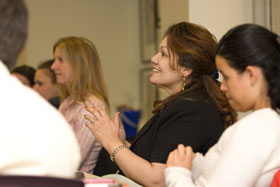  |
| HOME | THIS ISSUE | CALENDAR | GRANTS | BACK ISSUES | < BACK | NEXT > |
Professor says teachers should be engaged in the communityby Scott Brinckerhoff - April 30, 2007 | ||||
| The teaching and scholarly interests of Professor Xaé Alicia Reyes are difficult to categorize, by her own admission. “I’m eclectic,” she says. An associate professor in the Neag School of Education, with a joint appointment in the Puerto Rican and Latino Studies Institute, Reyes prepares students to become teachers. At least, that’s the shorthand way of describing what she does. But like Reyes herself, the longer version is more complex. Her approach to teaching about teaching goes well beyond dissecting what goes on in an effective classroom and into the realm of what makes a top-shelf teacher tick. Specifically, she tells students that civic engagement and spirituality are essential elements for developing empathy and an understanding of others’ needs and realities. Reyes believes that a teacher who has Latin students in the classroom should visit countries where the students come from and get to know the people, nuances of language, and educational contexts. “I want them to be very invested in the communities where they teach. Gaining some first-hand knowledge of the countries where their students and families come from is a good way to know the students better, and connect with them more effectively in the classroom,” Reyes says. “Traveling helps make a top-notch scholar, and a better human being, too.” She also believes that all people – not just students and teachers – tend to be more engaged in their communities if they join a church and participate in religious activities, or become involved in organizations such as soup kitchens and homeless shelters. Her students participate in events on and off the Storrs campus, putting into practice the notion of learning beyond the classroom. For her students, the local community is the classroom because, she says, “I have a gut belief that the university is supposed to serve society and not the other way around.” On one occasion, she went with students to a “Day of the Dead” exhibit in Windham, featuring displays and “altares” by Mexican artist Carlos Hernández-Chávez . It was an opportunity for students to walk around, ask questions, and learn something about how Mexicans commemorate the passing of loved ones. “They also ‘discovered’ Windham,” Reyes adds, “which some of them had been exposed to through their school internships.” Activism is at the heart of her teaching philosophy. Want to learn something about Latin culture? Visit a bodega. Never been to a Baptist church filled with African Americans? Attend a gospel concert. A synagogue? Partake in the celebration of a religious holiday such as Passover. Between the lines of a rapid-fire conversation with Reyes is the inescapable thought that students can end up teaching themselves at least as much as someone else can teach them. “I encourage them to stretch, to push their envelope,” she says. “Consider opinions that may not sit well with you. Hear diverse perspectives.”
She also tells students to look at how media shape public perceptions of a community. In the case of Willimantic, a CBS News report on drug use there tarnished the town’s image, and Reyes was among those who encouraged young people to take a look and see whether there was another side to the story. Students enrolled with Reyes are apt to be surprised by a teaching style that she describes as “edgy” and assignments that are not the norm. For example, she has students write autobiographies and says she is “obsessive about their backgrounds and the lessons they have learned in life.” She peppers students with provocative questions, some of them deliberately ambiguous: What do you know about diversity? Who would you like to work with? Who are your friends? How diverse is your inner circle? Should the United States promote an English-only policy? "Often I find that students haven’t really known anybody except people very similar to themselves,” she says. “So I try to help them see the richness of diversity, to explore personal feelings. Through e-mail reflections submitted by students, we engage in lively one-on-one dialogues.” As might be expected, Reyes shuns a cloistered academic environment. A native of Puerto Rico, she has conducted research in the Caribbean, Europe, Mexico, and South America. While growing up, she lived several years in Germany and Louisiana, courtesy of her father’s service with the U.S. Army. She has taught at the University of Puerto Rico, the University of Colorado, Syracuse and Brown universities, and Rhode Island and LeMoyne colleges. Much of her work centers on attracting minorities into teaching careers, but she has also taught Spanish and business courses. Her Ph.D. from the University of Colorado is in social, multicultural, bilingual foundations of education. She came to UConn in 1999. She teaches courses on Latinos and U.S. Education; Language and Ideology; and Research in Bilingual Education and English as a Second Language. In keeping with her guidance to students, Reyes too participates actively in her community, Willimantic, in both civic and spiritual affairs. She hosts a local cable show on education, and is active in the Diocese of Norwich. Last year, she authored a book that explores how a scholar’s personal background affects the subjects they research and how they conduct that research. The book encourages researchers to reveal their likely biases and methods up front, so readers can have a better context for interpreting findings and conclusions. |
| ADVANCE HOME UCONN HOME |

